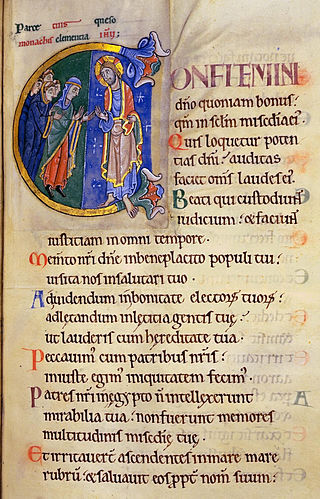
Psalm 89 is the 89th psalm of the Book of Psalms, beginning in English in the King James Version: "I will sing of the mercies of the LORD for ever". In the slightly different numbering system used in the Greek Septuagint and Latin Vulgate translations of the Bible, this psalm is Psalm 88. In Latin, it is known as "Misericordias Domini in aeternum cantabo". It is described as a maschil or "contemplation".
Sir George Job Elvey (1816–1893) was an English organist and composer.

The Parable of the Weeds or Tares is a parable of Jesus which appears in Matthew 13:24–43. The parable relates how servants eager to pull up weeds were warned that in so doing they would root out the wheat as well and were told to let both grow together until the harvest. Later in Matthew, the weeds are identified with "the children of the evil one", the wheat with "the children of the Kingdom", and the harvest with "the end of the age". A shorter, compressed version of the parable is found without any interpretation in the apocryphal Gospel of Thomas.
"For the Beauty of the Earth" is a Christian hymn by Folliott S. Pierpoint (1835-1917).

Hodie is a cantata by Ralph Vaughan Williams. Composed between 1953 and 1954, it is the composer's last major choral-orchestral composition, and was premiered under his baton at Worcester Cathedral, as part of the Three Choirs Festival, on 8 September 1954. The piece is dedicated to Herbert Howells. The cantata, in 16 movements, is scored for chorus, boys' choir, organ and orchestra, and features tenor, baritone, and soprano soloists.

Psalm 74 is the 74th psalm of the Book of Psalms, beginning in English in the King James Version: "O God, why hast thou cast us off for ever?". In the slightly different numbering system used in the Greek Septuagint and Latin Vulgate translations of the Bible, this psalm is Psalm 73. In Latin, it is known as "Ut quid Deus reppulisti in finem iratus". Subheaded a maschil or contemplation, and a community lament, it expresses the pleas of the Jewish community in the Babylonian captivity. It is attributed to Asaph.

Psalm 92 is the 92nd psalm of the Book of Psalms, beginning in English in the King James Version: "It is a good thing to give thanks unto the LORD". In the slightly different numbering system used in the Greek Septuagint and Latin Vulgate translations of the Bible, this psalm is Psalm 91. In Latin, it is known as "Bonum est confiteri Domino ". The psalm is known as Mizmor Shir L'yom HaShabbat, is ostensibly dedicated to the Shabbat day.

"The Hymn of Joy" is a poem written by Henry van Dyke in 1907 in being a Vocal Version of the famous "Ode to Joy" melody of the final movement of Ludwig van Beethoven's final symphony, Symphony No. 9.
"Faith of our Fathers" is a Catholic hymn, written in 1849 by Frederick William Faber in memory of the Catholic Martyrs from the time of the establishment of the Church of England by Henry VIII and Elizabeth. Faber wrote two versions of the hymn: one with seven stanzas for Ireland, and another with four for England. The Irish version was sung at hurling matches until the 1960s.

Psalm 16 is the 16th psalm in the Book of Psalms, beginning in English in the King James Version: "Preserve me, O God: for in thee do I put my trust."

Psalm 138 is the 138th psalm of the Book of Psalms, beginning in English in the King James Version: "I will praise thee with my whole heart". In Latin, it is known as "Confitebor tibi Domine in toto corde meo". The psalm is a hymn psalm.

Psalm 132 is the 132nd psalm of the Book of Psalms, beginning in English in the King James Version: "LORD, remember David, and all his afflictions". In the slightly different numbering system used in the Greek Septuagint version of the bible and in the Latin Vulgate, this psalm is Psalm 130. In Latin, it is known as "Memento Domine David".

Psalm 50, a Psalm of Asaph, is the 50th psalm from the Book of Psalms in the Bible, beginning in English in the King James Version: "The mighty God, even the LORD, hath spoken, and called the earth from the rising of the sun unto the going down thereof." In the slightly different numbering system used in the Greek Septuagint and Latin Vulgate translations of the Bible, this psalm is Psalm 49. The opening words in Latin are Deus deorum, Dominus, locutus est / et vocavit terram a solis ortu usque ad occasum. The psalm is a prophetic imagining of God's judgment on the Israelites.

Psalm 66 is the 66th psalm of the Book of Psalms, beginning in English in the King James Version: "Make a joyful noise unto God, all ye lands". In the slightly different numbering system of the Greek Septuagint version of the Bible and the Latin Vulgate, this psalm is Psalm 65. In Latin, it is known as "Iubilate Deo omnis terra". It is a psalm of thanksgiving probably intended for use at the Passover. The psalm is divided into two parts: in verses 1-12 the community praises God and invites the whole world to join in praise; in verses 13–20, "an individual from the rescued community fulfils a vow to offer a sacrifice of thanksgiving".

Psalm 68 is "the most difficult and obscure of all the psalms." In the English of the King James Version it begins "Let God arise, let his enemies be scattered". In the Latin Vulgate version it begins "Exsurgat Deus et dissipentur inimici eius". It has 35 verses. Methodist writer Arno C. Gaebelein calls it "The Great Redemption Accomplished" and describes it as "one of the greatest Psalms".

Psalm 77 is the 77th psalm of the Book of Psalms, beginning in English in the King James Version: "I cried unto God with my voice, even unto God with my voice; and he gave ear unto me". In the slightly different numbering system used in the Greek Septuagint and Latin Vulgate translations of the Bible, this psalm is Psalm 76. In Latin, it is known as "Voce mea ad Dominum clamavi".

Psalm 85 is the 85th psalm of the Book of Psalms, one of a series of psalms attributed to the sons of Korah. In the English of the King James Version, this psalm begins: "LORD, thou hast been favourable unto thy land". In the slightly different numbering system used in the Greek Septuagint and Latin Vulgate translations of the Bible, this psalm is Psalm 84. In Latin, it is known as "Benedixisti Domine terram tuam". In Judaism, it is called "a psalm of returned exiles". The Jerusalem Bible describes it as a "prayer for peace".
Psalm 86 is the 86th psalm of the Book of Psalms, beginning in English in the King James Version: "Bow down thine ear, O Lord, hear me: for I am poor and needy". In the slightly different numbering system used in the Greek Septuagint and Latin Vulgate translations of the Bible, this psalm is Psalm 85. In Latin, it is known as "Inclina Domine". It is attributed to David.

Psalm 106 is the 106th psalm of the Book of Psalms, beginning in English in the King James Version: "Praise ye the LORD. O give thanks unto the LORD; for he is good". The Book of Psalms is part of the third section of the Hebrew Bible, and a book of the Christian Old Testament. In the slightly different numbering system used in the Greek Septuagint and Latin Vulgate translations of the Bible, this psalm is Psalm 105. In Latin, it is known by the incipit, "Confitemini Domino quoniam bonus". Alexander Kirkpatrick observes that the two historical psalms, Psalms 105 and 106, are closely related. Psalm 105 gives thanks for God's faithfulness to the covenant he made with Abraham; Psalm 106 is a psalm of penitence, reciting the history of Israel's faithlessness and disobedience. He also notes that this psalm and Psalm 107 "are closely connected together", arguing that "the division of the fourth and fifth books does not correspond to any difference of source or character, as is the case in the other books".
"Crown Him with Many Crowns" is an 1851 hymn with lyrics written by Matthew Bridges and Godfrey Thring and sung to the tune 'Diademata' by Sir George Job Elvey. The hymn appears in many hymnals.
















